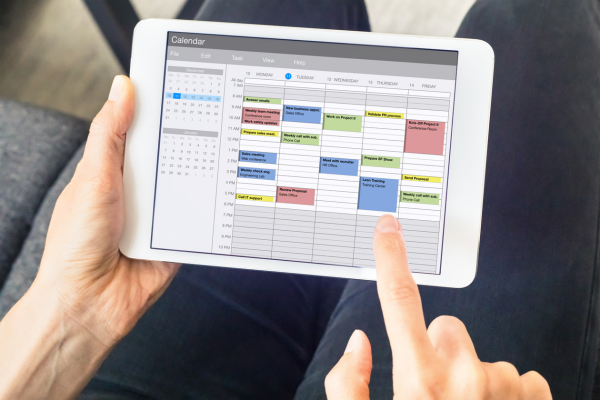
Now before you mutter, “I always thought that Graham Jones chap was odd,” I need to point something out. I am not the only person who behaves this way. In the office the other day one of my colleagues said he was very grateful because I had printed out the timetable for the term. The timetable, of course, is available electronically, but looking at a printed version seems easier and quicker.
As I write this, a calendar on the wall reminds me of the date. I frequently glance at it, to remind me where I am in the week. I even look at it when I am trying to organise things in my Google Calendar. Why on earth do I do that?
Things become even more complicated when you use multiple electronic diaries. You probably have a work calendar, such as Microsoft Outlook. In addition, you might have a personal electronic calendar like Google Calendar or iCloud Calendar. This leads to the difficulty of keeping them in sync. You can subscribe to various calendars to connect them to one-another. But the software companies only update the calendars every day or two. New office diary entries may not appear on your personal calendar on your phone for a few days. Is it any wonder we often get in a muddle?
I was thinking about all this the other day when I saw someone using a “Filofax” – remember them? I didn’t know you could still buy them. It reminded me that my colleagues on the Sales Chat Show use paper-based calendars, rather than digital ones. So I had to wonder, is there something about paper calendars we find useful?
I didn’t have to look far. I quickly discovered that researchers at California State University had been wondering the same thing. They showed paper calendars outperform digital diaries in providing a broader perspective. The researchers said, “Consumers are rapidly moving from paper to mobile calendars for convenience, but this research shows that doing so may lead individuals to be less successful in effectively developing and implementing their plans.”
Note – the researchers suggest you will be LESS successful in achieving your intentions if you use digital diaries instead of paper-based ones. It is another way in which the illusion of the digital world is reducing our productivity.
The problem, particularly for diaries on mobile phones, is that you can really only see one to three days at a time. That doesn’t let your brain get an idea of what you need to do over the coming weeks or months. The limited view of a digital planner often leads to constantly changing plans.
There appears to be a growing backlash against digital planning systems and online diaries. Just look at the online store, Etsy. It has 250 pages of items relating to paper-based planners – that’s 15,000 products. Not to be left out, The New York Times recently published a list of the best paper planners, as did Wired Magazine. Instagram and TikTok are full of “influencers” all explaining how it’s better to use paper planners and diaries. It’s strange that young, tech-savvy individuals are utilising a digital platform to explain the advantages of pen and paper!
What they have learned is that digital diaries and planners are brilliant at enabling us to see what each other is doing, so that we can book appointments more easily or organise meetings. However, these “influencers” have also realised that trying to organise their life is easier with pen and paper.
One reason is that we remember more when we write it, than when we type it. We feel more connected to the words when we write them. When we write things with a pen, our brain perceives the words themselves as our own individual creation, not something manufactured outside of us by a keyboard. Hence, we are more invested in the words we write than something we type.
In the preface of his book, “A Promised Land”, Barack Obama revealed he prefers to write with pen and paper saying “a computer gives even my roughest drafts too smooth a gloss and lends half-baked thoughts the mask of tidiness”. Author Stephen King would probably agree. In an interview with The Paris Review literary magazine back in 2006, he said that he had been writing some of his novels using pen and paper. He told the magazine,, “It seemed to me that my first draft was more polished, just because it wasn’t possible to go so fast.”
When we write with pen and paper, it forces us to be slower, and to think about things. With your calendar or planner, that means that you are more careful about organising your time. With a digital planner, it is all too easy to be quick, enter something, only to discover a couple of days later that the timings do not work and you have to reschedule.
The act of adding something to a digital calendar gives us the illusion we have sorted something out. We haven’t, because it is so fast it doesn’t allow us to see the bigger picture. That is also a problem for neurodivergent people, such as those with ADHD. Experts advise these individuals to use pen and paper rather than digital diaries.
To help get to grips with your calendar and planning, you might need something like the best-selling “Clever Fox” system. Alternatively, what also works is printing out your Google or Outlook Calendar and taking a few moments to write on it. That’s what I do.
I will let you into a little secret. Sometimes, my colleagues will see me wandering around with my notebook and a slip of paper. That document is usually a print-out of my calendar. There, finally, I am “out” as a user of pen and paper planning.
